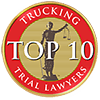
When you are injured on the job, you are faced with a number of questions. How long will I be out of work? What will my medical expenses be? How can I support my family if I can’t return to work?
In Ohio, these questions are rendered even more pressing by the limited time you have to file a workers’ compensation claim. In cases of workplace injury, you have just 1 year to report your injury to the Ohio Bureau of Workers’ Compensation.
Although most workers are familiar with workers’ compensation, many don’t know their right to sue for work-related injuries. There are important differences in the process of filing for workers’ comp benefits and pursuing a lawsuit against your employer or another party. It is crucial to speak to an experienced attorney for a clear understanding of your options.
Colombo Law serves workers in Columbus and nearby areas of Ohio who have been hurt on the job through no fault of their own. Please call (614) 362-7000 today for a free consultation.
How Are Personal Injury Lawsuits Different from Workers’ Compensation Claims?
Establishing fault is the key to any personal injury claim. To recover compensation, you must prove that the other party’s negligence resulted in your injuries.
Workers’ compensation, however, is a no-fault system. Injured workers have access to benefits regardless of who is at fault, and employers are in turn protected from employee lawsuits for injuries they sustain on the job. In effect, you give up your right to sue your employer for certain damages by accepting workers’ comp benefits.
Workers’ compensation benefits are also different from the damages you can recover in a personal injury lawsuit. Principally, workers’ comp is designed to pay for medical expenses and lost wages incurred from an on-the-job injury.
The compensation you pursue in a personal injury claim, however, should account for all of your losses, including:
- Medical expenses
- Lost wages
- Loss of earning capacity
- Pain and suffering
- Emotional distress
- Scarring and disfigurement
Settlement negotiations and, if necessary, trial proceedings in a personal injury lawsuit can take months or years. Workers’ compensation, however, is set up to provide benefits in a timely fashion to injured workers. The Ohio Bureau of Workers’ Compensation reviews claims within 28 days of being notified of a workplace injury.
When Can I Sue My Employer?
Although you will be unable to sue for economic damages (i.e., compensation for medical expenses and lost wages) if you are receiving workers’ comp benefits, you may still be able to pursue a claim for noneconomic damages (i.e., pain and suffering) not covered by workers’ compensation. It is in your interest to contact a workplace injury attorney before accepting a workers’ comp settlement to protect your right to full compensation.
Remember: Proving the defendant’s negligence is key to a successful outcome in your personal injury case. It is important to consider the circumstances of your injury.
You may not have a viable claim against your employer if your injuries are the result of an “occupational hazard.” Work environments such as construction sites, factories, and farms have a number of hazards that pose a risk to workers. However, your employer may be liable for failure to abide by workplace safety regulations, failure to provide you with protective gear and equipment, and more.
Filing Claims Against Third Parties for a Workplace Accident
Your employer is not the only party that owes you a duty of care when you are at work. Depending on the circumstances of the accident, you may be able to pursue compensation if a third party’s negligence caused your injuries.
There are a variety of cases in which a third party may be liable for a workplace accident. These parties may include:
- A contractor or subcontractor
- The owner of a property where you are doing your work (premises liability claim)
- A vendor
- The manufacturer of a defective product
- A coworker, if their negligence or misconduct falls outside of their regular work duties
Another instance where a third party may be liable for a work-related injury is a careless driver who causes a car accident while you are on the job. You may be able to recover damages in a lawsuit against the at-fault driver, as well as file for workers’ compensation benefits.
Contact Our Work Injury Lawyers in Columbus Today
The intersection between workers’ compensation and personal injury law is complicated. Add to this the limited time you have to seek benefits and compensation for your injuries (1 year for workers’ comp claims, 2 years for personal injury lawsuits), and it can be overwhelming to know what to do or where to turn.
Your best course of action if you have been injured on the job is to contact an experienced attorney to discuss your legal rights and options. Colombo Law will investigate the circumstances of your workplace accident and advise you of the remedies that may be available in your case.
Please call (614) 362-7000 today for a free consultation. Colombo Law serves clients in Columbus and nearby areas of Ohio.










